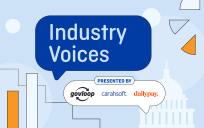Managing the diverse training requirements of a government agency workforce is no easy task — and well beyond the capabilities of traditional learning management systems (LMS).
Cloud computing, however, can revolutionize agencies’ learning development. Across state and local governments, agencies are now adopting cloud-based LMS suites to modernize their old processes. LMS suites are software applications for documenting, managing and providing educational and training programs.
LMS suites are software applications for documenting, managing and providing educational and training programs. When paired with cloud, these tools can offer adaptable, flexible and scalable learning development.
Below are best practices on how to improve your LMS.
1. Use cloud to cut costs
Cloud’s value stems from its ability to deliver products and services more affordably and efficiently. In terms of LMS, consider the cost of in-person trainings. Using cloud, agencies can deliver the same education online without spending budget dollars on educational materials, food and travel. Employees can also access digital trainings at their own pace whenever they’re ready. This protects office productivity while reducing costs.
2. Meet workers on their terms
Today, government workforces span several generations with varying preferences in technology. By embracing cloud, agencies can use LMS to bridge age, income and technology gaps in their talent. While millennials may favor mobile devices, younger employees may prefer tablets. By digitizing LMS training, agencies can offer it in ways that appeal to every demographic. Even better, this ensures that employees of all ages and technology preferences can easily access professional development opportunities when the inspiration strikes them.
3. Count on automated compliance
Automation can help with multiple compliance-related issues. For instance, functions that agencies can automate for their HR personnel include providing training, managing certifications and reporting on compliance results. By automating these and other tasks, agencies can make it easier for their HR teams to do their jobs. In turn, HR professionals can perform more complicated and fulfilling tasks while automation handles simpler duties such as filing compliance records.
4. Create more collaborative workforces
Cloud can help agencies break through their communication barriers by fostering more connected workforces. First, LMS can deliver unified training experiences across large distances, bringing together coworkers in different cities, counties or states. Second, these tools can also enable social workgroups that make training lively online social interactions. Finally, LMS makes it easier for public servants to collaborate and share training and other information on computers, mobile devices and tablets. 5. Think long-term with cloud-based LMS The days of planning only for the immediate future are gone with cloud-based LMS. Using data from their LMS suites, agencies can make more intelligent, long-term decisions about their workforces and how to educate them. The insights such metrics produce can eventually help agencies prepare for age-based gaps in their workforces by recruiting, retaining and reskilling their talent.
This blog post is an excerpt from our new report, Boosting Employee Satisfaction With Modern Learning Development, download it here to learn how the cloud can revolutionize agencies’ learning development and create more compliant, engaged and satisfied workforces.





Leave a Reply
You must be logged in to post a comment.